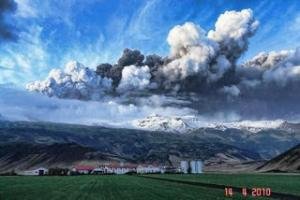Life under the Volcano
At first, I thought it was a hoax. A news flash on the BBC announcing that all UK flights were cancelled seemed like science fiction. Five days later, of course, the entire world knows all about Iceland’s Eyjafjallajökull glacier and the ash cloud that continues to block air travel over much of Europe.
The human and economic disruption has already been considerable. Millions of people have been stranded, millions of pounds of business lost, and hundreds of tonnes of perishable foods destined for Europe – such the famous Kenyan beans – destroyed. The misery and loss are real – but how much worse could it get?
Yesterday, Iceland’s president Olafur Grimsson warned that the current disruption was ‘just a small rehearsal’ for what could come. Nearby Katla, a much larger volcano close to the current eruption, is apparently overdue. It generally erupts every 40-80 years, and last did so in 1918. When Katla blows (and it is a matter of when, not if) Europe could be shrouded in ash for months. What then?
The answer could be economic and human catastrophe on a scale of which we can barely conceive. In 1783, another Icelandic volcano, Laki, erupted with such force that its poisonous fumes killed half of Iceland’s livestock, a quarter of its population, and many further deaths throughout Europe. The ash cloud, which remained for many months, altered weather patterns across the globe, creating several years of extreme weather that led to failed harvests and famine as far afield as Japan, and most famously in France (Laki is the often uncredited factor leading to the French Revolution).
Should such an eruption occur today, the availability of melon in April would be the least of our worries. The volcano is a wake-up call: a glimpse of what life might be like after Peak Oil – a reminder that the systems upon which we now rely – our just-in-time, computer-run, energy dependent, economically ‘efficient’ global networks – are as brittle as the philosophy that created them. Mother Nature is reminding us who’s boss. We should take this opportunity to listen to her.
(Photo by Ólafur Eggertsson)











